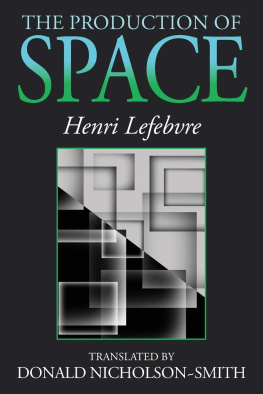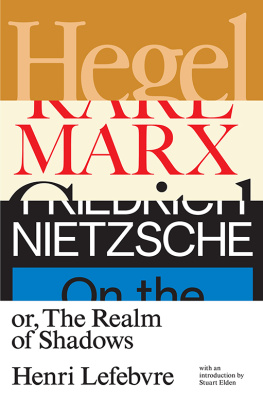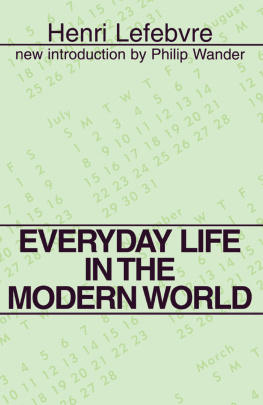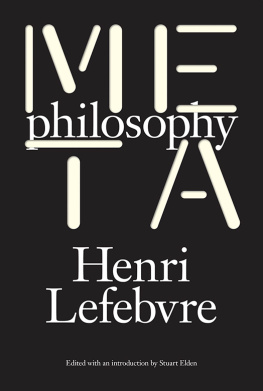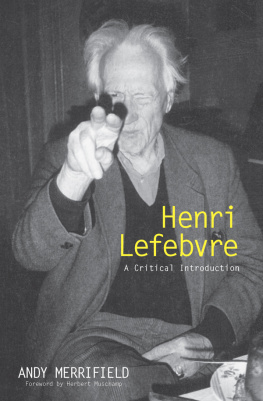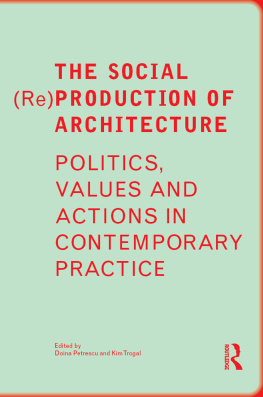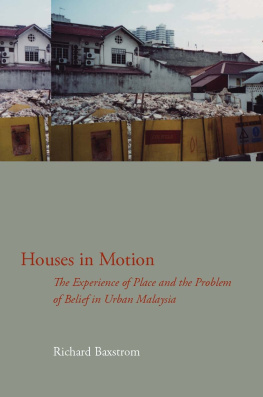Henri Lefebvre - The Production of Space
Here you can read online Henri Lefebvre - The Production of Space full text of the book (entire story) in english for free. Download pdf and epub, get meaning, cover and reviews about this ebook. year: 1992, publisher: Wiley, genre: Religion. Description of the work, (preface) as well as reviews are available. Best literature library LitArk.com created for fans of good reading and offers a wide selection of genres:
Romance novel
Science fiction
Adventure
Detective
Science
History
Home and family
Prose
Art
Politics
Computer
Non-fiction
Religion
Business
Children
Humor
Choose a favorite category and find really read worthwhile books. Enjoy immersion in the world of imagination, feel the emotions of the characters or learn something new for yourself, make an fascinating discovery.
- Book:The Production of Space
- Author:
- Publisher:Wiley
- Genre:
- Year:1992
- Rating:5 / 5
- Favourites:Add to favourites
- Your mark:
- 100
- 1
- 2
- 3
- 4
- 5
The Production of Space: summary, description and annotation
We offer to read an annotation, description, summary or preface (depends on what the author of the book "The Production of Space" wrote himself). If you haven't found the necessary information about the book — write in the comments, we will try to find it.
The Production of Space — read online for free the complete book (whole text) full work
Below is the text of the book, divided by pages. System saving the place of the last page read, allows you to conveniently read the book "The Production of Space" online for free, without having to search again every time where you left off. Put a bookmark, and you can go to the page where you finished reading at any time.
Font size:
Interval:
Bookmark:
 TRANSLATED BY
TRANSLATED BY The Production of Space
Translated by
Donald Nicholson-Smith
BLACKWELL PUBLISHING
350 Main Street, Malden, MA 02148-5020, USA 9600 Garsington Road, Oxford OX4 2DQ UK 550 Swanston Street, Carlton, Victoria 3053, Australia
All rights reserved. No part of this publication may be reproduced, stored in a retrieval system, or transmitted, in any form or by any means, electronic, mechanical, photocopying, recording or otherwise, except as permitted by the UK Copyright, Designs, and Patents Act 1988, without the prior permission of the publisher.
English translation first published 199126 2008
Library of Congress Cataloging-in-Publication Data
[Production de l'espace, English]
The production of space I Henri Lefebvre; translated by Donald Nicholson-Smith p. em.
Translation of: La production de l'espace.
Includes bibliographical references and index. ISBN 978-0-631-18177-4 (pbk.: alk. paper)
1. Space and time. I. Title.
115-dc20 90-21058 CIP
A catalogue record for this title is available from the British Library.
Set in 10 on 12 pt Sabon by Photographics Honiton Devon Printed and bound in Malaysia by Vivar Printing Sdn Bhd.
The publisher's policy is to use permanent paper from mills that operate a sustainable forestry policy, and which has been manufactured from pulp processed using
acid-free and elementary chlorine-free practices. Furthermore, the publisher ensures that the text paper and cover board used have met acceptable environmental accreditation standards.
For further information on Blackwell Publishing, visit our website: www.blackwellpublishing.com
EnvoiImprisoned by four walls
(to the North, the crystal of non-knowledge a landscape to be invented
to the South, reflective memory
to the East, the mirror
to the West, stone and the song of silence) I wrote messages, but received no reply.
Translator's Acknowledgements IX
1 Plan of the Present Work 1
2 Social Space 68
3 Spatial Architectonics 169
4 From Absolute Space to Abstract Space 229
5 Contradictory Space 292
6 From the Contradictions of Space to Differential Space 352
7 Openings and Conclusions 401
Afterword by David Harvey 425
Index 435
For various forms of aid in the preparation of this translation, I should like to express my sincerest gratitude to T. J. Clark, Andre Fougerousse, Lisa Mockler, M. N. Rublowska and - most particularly - the late Susan C. K. Hopkins. I should also like to thank my copy editor, Graham Eyre; and, above all for their patience, John Davey and Jan Chamier, my editors at Blackwell Publishers.
D. N.-S.1 Plan of the Present WorkI
Plan of the Present WorkI Not so many years ago, the word 'space' had a strictly geometrical meaning: the idea it evoked was simply that of an empty area. In scholarly use it was generally accompanied by some such epithet as 'Euclidean', 'isotropic', or 'infinite', and the general feeling was that the concept of space was ultimately a mathematical one. To speak of 'social space', therefore, would have sounded strange.
Not that the long development of the concept of space had been forgotten, but it must be remembered that the history of philosophy also testified to the gradual emancipation of the sciences - and especially of mathematics - from their shared roots in traditional metaphysics. The thinking of Descartes was viewed as the decisive point in the working-out of the concept of space, and the key to its mature form. According to most historians of Western thought, Descartes had brought to an end the Aristotelian tradition which held that space and time were among those categories which facilitated the naming and classing of the evidence of the senses. The status of such categories had hitherto remained unclear, for they could be looked upon either as simple empirical tools for ordering sense data or, alternatively, as generalities in some way superior to the evidence supplied by the body's sensory organs. With the advent of Cartesian logic, however, space had entered the realm of the absolute. As Object opposed to Subject, as res extensa opposed to, and present to, res cogitans, space came to dominate, by containing them, all senses and all bodies. Was space therefore a divine attribute? Or was it an order immanent to the totality of what existed? Such were the terms in which the problem was couched for those philosophers who came in Descartes's wake - for Spinoza, for Leibniz, for the Newtonians. Then Kant revived, and revised, the old notion of the category. Kantian space, albeit relative, albeit a tool of knowledge, a means of classifying phenomena, was yet quite clearly separated (along with time) from the empirical sphere: it belonged to the a priori realm of consciousness (i.e. of the 'subject'), and partook of that realm's internal, ideal - and hence transcendental and essentially ungraspable structure.
These protracted debates marked the shift from the philosophy to the science of space. It would be mistaken to pronounce them outdated, however, for they have an import beyond that of moments or stages in the evolution of the Western Logos. So far from being confined within the abstractness with which that Logos in its decline endowed so-called pure philosophy, they raise precise and concrete issues, among them the questions of symmetry versus asymmetry, of symmetrical objects, and of the objective effects of reflections and mirrors. These are all questions to which I shall be returning because of their implications for the analysis of social space.
IIMathematicians, in the modern sense of the word, emerged as the proprietors of a science (and of a claim to scientific status) quite clearly detached from philosophy - a science which considered itself both necessary and self-sufficient. Thus mathematicians appropriated space, and time, and made them part of their domain, yet they did so in a rather paradoxical way. They invented spaces - an 'indefinity', so to speak, of spaces: non-Euclidean spaces, curved spaces, x-dimensional spaces (even spaces with an infinity of dimensions), spaces of configuration, abstract spaces, spaces defined by deformation or transformation, by a topology, and so on. At once highly general and highly specialized, the language of mathematics set out to discriminate between and classify all these innumerable spaces as precisely as possible. (Apparently the set of spaces, or 'space of spaces', did not lend itself very readily to conceptualization.) But the relationship between mathematics and reality
- physical or social reality - was not obvious, and indeed a deep rift had developed between these two realms. Those mathematicians who had opened up this 'problematic' subsequently abandoned it to the philosophers, who were only too happy to seize upon it as a means of

making up a little of the ground they had lost. In this way space became
- or, rather, once more became - the very thing which an earlier philosophical tradition, namely Platonism, had proposed in opposition

to the doctrine of categories: it became what Leonardo da Vinci had called a 'mental thing'. The proliferation of mathematical theories
Font size:
Interval:
Bookmark:
Similar books «The Production of Space»
Look at similar books to The Production of Space. We have selected literature similar in name and meaning in the hope of providing readers with more options to find new, interesting, not yet read works.
Discussion, reviews of the book The Production of Space and just readers' own opinions. Leave your comments, write what you think about the work, its meaning or the main characters. Specify what exactly you liked and what you didn't like, and why you think so.

